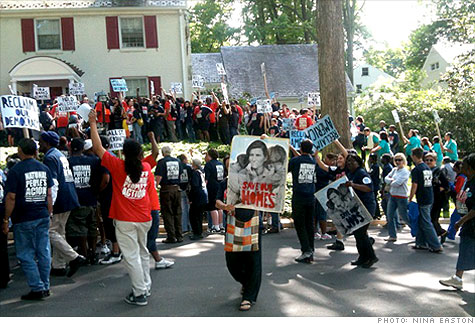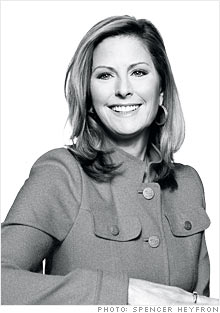Search News

(FORTUNE) -- Every journalist loves a peaceful protest-whether it makes news, shakes up a political season, or holds out the possibility of altering history. Then there are the ones that show up on your curb--literally.
Last Sunday, on a peaceful, sun-crisp afternoon, our toddler finally napping upstairs, my front yard exploded with 500 screaming, placard-waving strangers on a mission to intimidate my neighbor, Greg Baer. Baer is deputy general counsel for corporate law at Bank of America (BAC, Fortune 500), a senior executive based in Washington, D.C. And that -- in the minds of the organizers at the politically influential Service Employees International Union and a Chicago outfit called National Political Action -- makes his family fair game.

Waving signs denouncing bank "greed," hordes of invaders poured out of 14 school buses, up Baer's steps, and onto his front porch. As bullhorns rattled with stories of debtor calls and foreclosed homes, Baer's teenage son Jack -- alone in the house -- locked himself in the bathroom. "When are they going to leave?" Jack pleaded when I called to check on him.
Baer, on his way home from a Little League game, parked his car around the corner, called the police, and made a quick calculation to leave his younger son behind while he tried to rescue his increasingly distressed teen. He made his way through a din of barked demands and insults from the activists who proudly "outed" him, and slipped through his front door.
"Excuse me," Baer told his accusers, "I need to get into the house. I have a child who is alone in there and frightened."
Now this event would accurately be called a "protest" if it were taking place at, say, a bank or the U.S. Capitol. But when hundreds of loud and angry strangers are descending on your family, your children, and your home, a more apt description of this assemblage would be "mob." Intimidation was the whole point of this exercise, and it worked-even on the police. A trio of officers who belatedly answered our calls confessed a fear that arrests might "incite" these trespassers.
What's interesting is that SEIU, the nation's second largest union, craves respectability. Just-retired president Andy Stern is an Obama friend and regular White House visitor. He sits on the President's Fiscal Responsibility Commission. He hobnobs with those greedy Wall Street CEOs -- executives much higher-ranking than my neighbor Baer -- at Davos. His union spent $70 million getting Democrats elected in 2008.
In the business community, though, SEIU has a reputation for strong-arm tactics against management, prompting some companies to file suit.
Now those strong-arm tactics, stirred by supposedly free-floating (as opposed to organized) populist rage, have come to the neighborhood curb. Last year it was AIG executives -- with protestors met by security guard outside. Now it's any executive -- and they're on the front stoop. After Baer's house, the 14 buses left to descend on the nearby residence of Peter Scher, a government relations executive at JPMorgan Chase (JPM, Fortune 500).
Targeting homes and families seems to put SEIU in the ranks of (now jailed) radical animal-rights activists and the Kansas anti-gay fundamentalists harassing the grieving parents of a dead 20-year-old soldier at his funeral (the Supreme Court has agreed to weigh in on the latter). But that's not a conversation that SEIU officials want to have.
When I asked Stephen Lerner, SEIU's point-person on Wall Street reform, about these tactics, he accused me of getting "emotional." Lerner was more comfortable sticking to his talking points: "Millions of people are losing their homes, and they have gone to the banks, which are turning a deaf ear."
Okay, fine, then why not continue SEIU protests at bank offices and shareholder meetings-as the union has been doing for more than a year? Lerner insists, "People in powerful corporations seem to think they can insulate themselves from the damage they are doing."
Bank of America officials dispute Lerner's assertion about the "damage they are doing," citing the success of workout programs to help distressed homeowners, praise received from community groups, the bank's support of financial reform legislation, and the little-noticed fact that Bank of America exited the subprime lending business in 2001.
SEIU has said it wants to organize bank tellers and call centers -- and its critics point out that a great way to worsen employee morale, thereby making workers more susceptible to union calls, is to batter a bank's image through protest. (SEIU officials say their anti-Wall Street campaign has nothing to do with their organizing efforts.) Complicating this picture is the fact that BofA is the union's lender of choice -- and SEIU, suffering financially, owes the bank nearly $4 million in interest and fees. Bank of America declined comment on the loans.
But SEIU's intentions, and BofA's lender record, are ripe subjects to debate in Congress, on air, at shareholder hearings. Not in Greg Baer's front yard.
Sunday's onslaught wasn't designed for mainstream media consumption. There were no reporters from organizations like the Washington Post, no local camera crews who might have aired criticism of this private-home invasion. With the media covering the conservative Tea Party protesters, the behavior of individual activists has drawn withering scrutiny.
Instead, a friendly Huffington Post blogger showed up, narrowcasting coverage to the union's leftist base. The rest of the message these protesters brought was personal-aimed at frightening Baer and his family, not influencing a broader public.
Of course, HuffPost readers responding to the coverage assumed that Baer was an evil former Bush official. He's not. A lifelong Democrat, Baer worked for the Clinton Treasury Department, and his wife, Shirley Sagawa, author of the book The American Way to Change and a former adviser to Hillary Clinton, is a prominent national service advocate.
In the 1990s, the Baers' former bosses, Bill and Hillary Clinton, denounced the "politics of personal destruction." Today politicians and their voters of all stripes grieve the ugly bitterness that permeates our policy debates. Now, with populist rage providing a useful cover, it appears we've crossed into a new era: The politics of personal intimidation. ![]()






| Company | Price | Change | % Change |
|---|---|---|---|
| Ford Motor Co | 8.29 | 0.05 | 0.61% |
| Advanced Micro Devic... | 54.59 | 0.70 | 1.30% |
| Cisco Systems Inc | 47.49 | -2.44 | -4.89% |
| General Electric Co | 13.00 | -0.16 | -1.22% |
| Kraft Heinz Co | 27.84 | -2.20 | -7.32% |
| Index | Last | Change | % Change |
|---|---|---|---|
| Dow | 32,627.97 | -234.33 | -0.71% |
| Nasdaq | 13,215.24 | 99.07 | 0.76% |
| S&P 500 | 3,913.10 | -2.36 | -0.06% |
| Treasuries | 1.73 | 0.00 | 0.12% |
|
Bankrupt toy retailer tells bankruptcy court it is looking at possibly reviving the Toys 'R' Us and Babies 'R' Us brands. More |
Land O'Lakes CEO Beth Ford charts her career path, from her first job to becoming the first openly gay CEO at a Fortune 500 company in an interview with CNN's Boss Files. More |
Honda and General Motors are creating a new generation of fully autonomous vehicles. More |
In 1998, Ntsiki Biyela won a scholarship to study wine making. Now she's about to launch her own brand. More |
Whether you hedge inflation or look for a return that outpaces inflation, here's how to prepare. More |